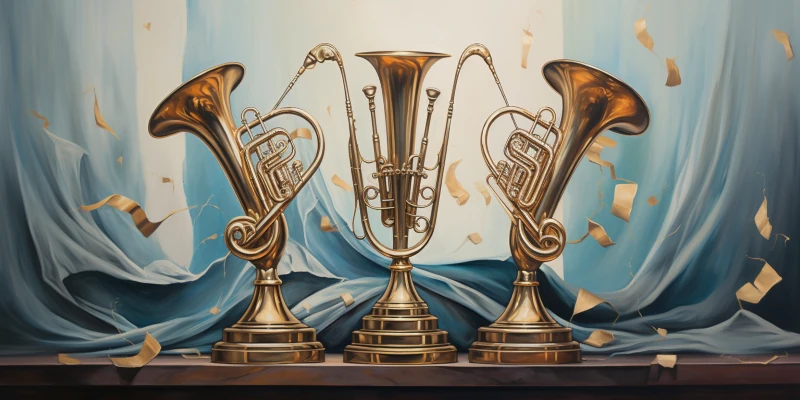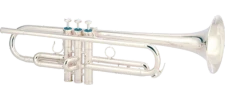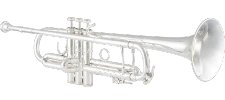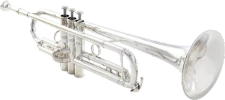
This post may contain affiliate links and we may receive compensation if you purchase products linked to below. As an Amazon Associate, we can earn from qualifying purchases. Please see our Terms and Conditions for details.
For trumpet players looking to upgrade, choosing the right pro model can transform your skills. But with so many options on the market, how do you determine which professional trumpet is right for your needs?
We’ve compared three of the best professional trumpets side-by-side to help you discover the ideal instrument to match your playing style and goals. But before going into too much detail, here’s the quick rundown of our top three picks.
| Photo | Model | Ranking | Price (USD) | Where to Buy |
|---|---|---|---|---|
 | Schilke B1 | Best overall | $3,500-$3,800 | |
 | Bach 180S37 Stradivarius | Best value for money | $3,150-$3,300 | |
 | Yamaha YTR-8335IIRS Xeno | Best for jazz | $3,200-$3,400 |
Why upgrade to a professional model trumpet?
As an adult who first learned on a beat-up student trumpet in high school, I remember the thrill of finally saving up enough money to buy my first professional model. The jump in tone quality and ease of playing was jaw-dropping—I only wished I could afford to upgrade years earlier!
If you’ve been playing trumpet for years on a beginner or intermediate student model, you may be feeling limited by issues like poor intonation, lackluster tone, and inconsistent playability.
Upgrading to a pro horn allows you to unlock richer, more nuanced expression. But when is the right time to make the investment? Here are three signs it may be time to upgrade:
- You’ve reached the technical limits of your current trumpet. If you’ve mastered the full range and technique possible on a starter model, you’ll benefit from the increased projection and tuning capabilities of a pro horn.
- You’re hitting plateaus in your playing. If you seem to have stopped improving tone quality, endurance, or other skills, a higher-quality instrument can help you progress to the next level.
- Your musical goals demand more. If you want to audition for prestigious ensembles or pursue trumpet performance, you’ll need an instrument up to the challenge.
Now, if you’ve never looked at upgrading to a professional trumpet, you’re probably wondering how much a pro instrument will set you back.
How much does a professional trumpet cost?
For those accustomed to beginner trumpet prices, the financial investment required for a pro-level instrument may come as a surprise. Here’s an overview of the cost range:
- Student trumpets usually cost $300-$800.
- Intermediate models run $800-$1500.
- Professional trumpets generally start around $1500 and can go up to $4000+ for high-end horns.
- Handmade custom/boutique trumpets often cost $3000-$5000 but can be much higher.
The jump from a student horn to an entry-level pro trumpet is significant. However, many serious students making the upgrade find the benefits well worth the extra cost when it comes to tone, intonation, playability and durability.
With pro models, you often get what you pay for. Inexpensive horns may cut corners, while pricey handmade trumpets receive exceptional attention to detail. Do your research to find the ideal balance of price and value for your needs.
Buying new vs. used professional models
If you’re looking to purchase a pro-level trumpet, deciding between new and used models brings trade-offs.
Buying new gives you predictability – you know exactly what you’re getting and have full warranty protection. But as we’ve just seen, new pro trumpets have a high starting price.
Going used can save you a lot of money. Vintage models hold their value but generally sell for 30-50 percent less than new. However, you give up warranty protection and may need repairs.
With used horns, playability testing before buying is essential. Examine finish, slides, valves, and bells for wear. Sound and response should be consistent across registers. For many buyers, purchasing new for a first pro horn and then exploring used options for future upgrades makes the most sense financially when building a collection.
Next let’s get into the details of some of the best pro trumpets on the market.
Best professional trumpet overall – Schilke B1
Known for its brilliant, laser-focused sound, the Schilke B1 trumpet delivers elite-level performance perfect for classical, orchestral playing or most any kind of music, really. As the standard professional model from storied American maker Schilke, the B1 combines easy blowing feel with tuning accuracy on par with top-tier trumpets.
The B1 was also the preferred Bb trumpet of Schilke founder Renold O. Schilke and became the basis in design for the other B & X Series instruments. Professional trumpet players tend to hold the B1 in high regard as one of the best all-around horns. Let’s take a closer look at what makes this horn stand out:
Key benefits
- Provides a balanced, flexible tone with its .460” medium-large bore.
- Offers excellent projection and resonance with the 5” one-piece yellow brass bell with #1 taper.
- Reduces fatigue during playing with its lightweight 4.5 lb design.
- Increases brilliance and resistance with its silver plated finish.
- Allows greater control over tone and intonation with the reverse leadpipe.
- Aids comfort and accuracy while playing with the 1st slide saddle and 3rd slide ring features.
Available options
- 1st slide ring
- Pinky ring
- 3rd slide waterkey
- Amado waterkey(s)
- Sterling silver bell, which offers a focused, dense sound and is darker in timbre in softer dynamics and brighter in louder dynamics
- “Beryllium” bell, which is a thinner bell that performs similarly to a copper bell but with a brighter and more resonant dynamic range
- Tuning bell
Pros
- Clear, consistent articulation even at extreme dynamics
- Excellent intonation across all registers
- Lightweight body design reduces fatigue
- Exceptional responsiveness
Cons
- Slightly darker sound may make this a less ideal choice for commercial work
- More expensive than some other professional models
Cost effectiveness
The Schilke B1 retails for $3,500-$3,800 new, comparing favorably to some handmade boutique trumpets costing $4,000 or more. You can sometimes find used B1 models in good condition for around $1,700, offering further savings. The nickel-silver alloy body is more economical than the sterling silver used in Schilke’s top Symphony Series models.
Reputation and popularity
Trusted by many professional artists, Schilke trumpets are renowned for their bright, focused sound preferred by classical and orchestral players. Top orchestras rely on Schilke’s playability and tuning accuracy. Students appreciate the B1 as a high quality yet accessible professional horn.
Schilke also offers a limited lifetime warranty protecting against defects in workmanship and materials under normal wear conditions.
Now let’s examine another storied American name in trumpets: the Bach 180S37 Stradivarius.
Best professional trumpet for the money – Bach 180S37 Stradivarius
The 180S37 is renowned as one of the top all-around professional trumpets for its versatility across musical genres. And as the least expensive of the three greats reviewed here, it also offer the best value for money.
Some trumpet players feel the 180S37 is a strong choice for anyone playing in a big band section as well, given its more directional sound. It has a reverse leadpipe, which helps with intonation and gives the horn a more free-flowing feel. Handmade in Indiana, USA, the Bach Strad blends characteristic warmth with technical agility.
Key benefits
- Provides a rich, broad tone with its .459” medium-large bore.
- Allows smooth action with its Monel pistons and stainless casings.
- Offers unmatched resonance with its hand-hammered, yellow brass, #37 one-piece bell.
- Adds comfort and control with the thumb saddle on the first valve.
Pros
- Balanced warm yet brilliant tone suits any genre
- Excellent projection and intonation across registers
- Fast piston valves suit technical passages
- The most recorded trumpet model
Cons
- None
Cost effectiveness
With a retail price at $3,150-$3,300 new, the 180S37 offers great value for a handcrafted professional trumpet made in the USA. You can typically find used models in good condition selling for as little as $1,500. This is a versatile horn that will last decades if you take good care of it.
Reputation and popularity
The Bach Stradivarius 180S37 is the most recorded trumpet in history and remains a go-to model for artists across all genres. It is a perennially top choice as a first professional-level trumpet. Many say the iconic Bach Strad line sets the standard for all trumpets.
Now let’s examine another top pro horn, the Yamaha YTR-8335IIRS Xeno, known for its warmth and expression suited to jazz.
Best professional trumpet for jazz – Yamaha YTR-8335IIRS Xeno
First introduced in the 1970s, the Xeno trumpet line from Yamaha has become a favorite of top artists for its singing warm tone and effortless playability. The model 8335IIRS exemplifies the qualities that make Xeno one of the most popular pro-level horns available today.
I generally side with many trumpet players in saying that the versatility is in the player, more so than in the horn. But this horn would be a great choice for lead jazz, in particular.
The 8335 is viewed by many trumpet players as a major improvement over Yamaha’s previous generations of Xeno horns with less resistance and more flexibility due to its reverse leadpipe. And this
Key benefits
- Provides a rich, focused sound with its medium-large .459” bore.
- Offers lightweight playability with its one-piece, 4.9” yellow brass bell.
- Allows fast action with its top-action Monel pistons.
- Adds brightness with its silver-plating finish.
- Improves resistance and airflow with its reverse tuning slide and leadpipe.
- Enables faster response with its extra thin valve casings.
Pros
- Strong playability in the upper register
- Excellent projection and dynamics across the range
- Very consistent and durable build quality
Cons
- Heavier weight may cause fatigue over longer playing sessions
Cost effectiveness
With a retail price around $3,200-$3,400, the 8335IIRS provides professional quality and performance at a reasonable price point compared to other pro horns. Yamaha’s consistency keeps the cost down while maintaining top standards. For its warmth and playability, it’s a great value purchase for serious musicians.
Reputation and popularity
With a loyal following among jazz artists and educators, the Xeno remains one of the most popular choices as a first professional trumpet. Its singing tone and comfortable feel set it apart from many horns. The 8335IIRS exemplifies the consistent quality that makes Xeno a market leader.
Evaluating key trumpet features
When comparing professional trumpet models, there are several key features to evaluate that impact tone, playability, and performance.
Bore size
The bore taper through the leadpipe and valves affects resistance and blow feel. Smaller bores around .430” offer quick response and easy upper register playing but reduce fullness of tone. Larger bores around .462” provide a bigger, bolder sound with more depth but require greater air support.
Bell size
Larger bell diameters from 4.8”-5” give more projection and volume as well as richer harmonics in the sound. Smaller 4.5”-4.6” bells offer a more controlled and focused tone. Bell throats also affect tone (related: Trumpet Bells and Their Differences).
Leadpipe
The leadpipe design impacts airflow resistance which influences blowing feel. Narrower tapers mean freer blowing but reduce tonal richness. Wider tapers provide a fatter, darker sound but make the horn harder to blow.
Valves
Piston valve trumpets have quick light action better for faster passages, while rotary valve models offer more resistance and a warmer, darker tone. Piston materials like Monel or stainless steel impact durability.
Materials
Brass alloys like yellow brass provide brightness while rose brass enhances warmth and reduces resistance. Nickel silver is more durable than brass. Silver or gold plating also affects tone and resistance.
Weight
Heavier horns require greater air support from the player but offer better projection of sound. Lightweight models are more agile and easier for young students or extended playing sessions, but they may lack fullness of tone.
Craftsmanship
Attention to detail in craftsmanship affects consistency and playability. Hand-hammering and hand-lapping help create smooth valves with tight tolerances.
One-piece spun bells often offer better resonance than two-piece welded bells. The method of bracing and bell construction impacts vibration and tone. High-end makers use proprietary techniques to optimize playability and reduce manufacturing variances between horns.
Recommended accessories
Here are some helpful accessories to consider for getting the most out of a new professional model trumpet:
Protective case
A hard shell case with plush interior lining will properly protect your trumpet during transport and storage. Models with TSA approved locks allow flying with the instrument. Sturdy handles make carrying easy.
Cleaning tools
Flexible snake, valve, and mouthpiece brushes reach tight spaces to remove buildup and debris while avoiding scratches. Valve oil flushes out gunk and ensures smooth piston action (relevant: Best Trumpet Valve Oils: A Complete Guide). Tuning slide grease prevents seizing.
Polishing cloth
A treated polishing cloth gently cleans lacquered finishes without scratching. Regular gentle polishing maintains the shine and prevents tarnish and corrosion. Avoid abrasive cleaners.
Assorted mutes
Mutes like the straight, cup, bucket, and harmon models alter timbre and volume. Straight mutes brighten sound with a focused pitch. Cup mutes provide a mellower tone. Harmon mutes create a buzzy timbre.
Music stand
A folding metal stand allows hands-free sheet music access while playing. Look for a sturdy model with a locking design, adjustable height, and carrying bag.
Humidifier
Humidity control prevents the trumpet valves and slides from seizing or binding due to swelling (related: Trumpet Valve Stuck? Here’s How to Fix It). Use humidity regulating packets inside the case.
Metronome/tuner
A digital metronome and chromatic tuner are essential practice tools for developing timing, speed, and intonation. Clip-on tuners also work for silent tuning.
Caring for your professional trumpet
Investing in a pro-level trumpet requires proper care and maintenance to keep it performing its best for years to come. Here are some tips:
- Oil valves and grease tuning slides monthly to prevent seizing and corrosion. Flush valves out with valve oil.
- Use a snake brush, valve brush, and mouthpiece brush for regular cleaning. Disassemble and hand clean annually.
- Polish with a treated polishing cloth to protect lacquer finish. Avoid abrasive cleaners.
- Store the trumpet in its case when not in use to prevent dents and damage. Keep the case locked during transport.
- Bring to a repair tech annually for servicing and replacement of worn parts. Address any tuning issues or dents.
With regular care, most professional trumpets will provide a lifetime of use. Taking the time to learn proper maintenance routines will preserve the playability and value of your investment.
Conclusion
For trumpet players looking to upgrade to a professional horn, choosing the right model can be daunting given the many options on the market. By comparing critical features like bore taper, materials, and craftsmanship, you can determine which pro trumpet best matches your needs and style.
The Yamaha YTR-8335IIRS Xeno stands out for its warm, singing tone perfect for jazz while still maintaining excellent projection and playability that make it arguably the best all-around professional trumpet.
For those focused on classical and orchestral work, the brilliant clarity and laser precision of the Schilke B1 can’t be beaten. It’s also a great choice if you’re more budget conscious.
And the Bach 180S37 Stradivarius remains a versatile gold standard, blending warmth and brightness in a handcrafted American horn at a great price.
While not cheap, investing in a pro-level instrument means you have an instrument that will grow with you through years of practicing, performing, and progression to more advanced techniques. With proper maintenance and care, a professional trumpet can last a lifetime. Equipping yourself with the right accessories further enhances the experience.
There’s no universal best professional trumpet for all players. But by identifying your preferred sound, feel, and price range, you can confidently choose a pro model that becomes an inspiring musical partner as you take your trumpet playing to the next level.
Leave a Reply